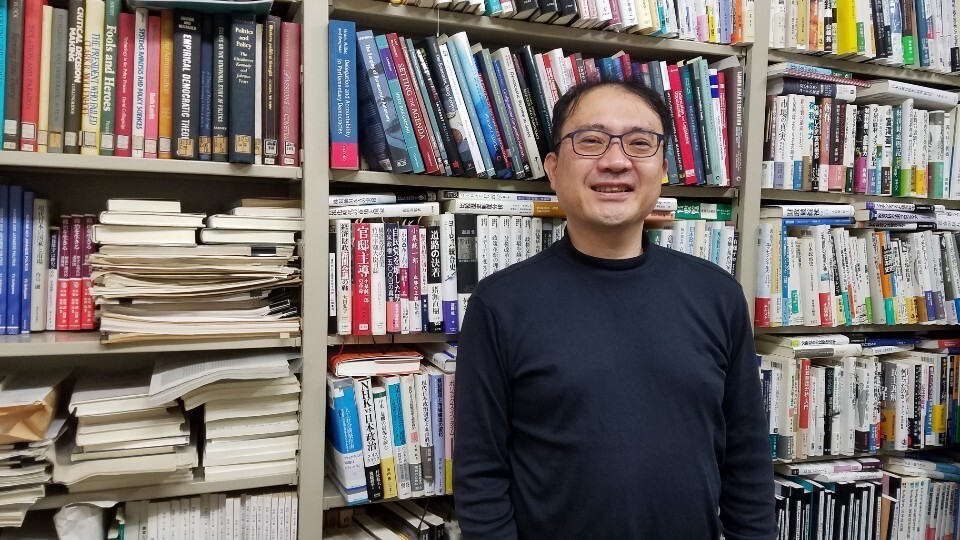hankyoreh
Links to other country sites 다른 나라 사이트 링크
[Interview] How has Abe stayed in power for so long?

“The Shinzo Abe administration is quite adept at handling controversy. During elections, they don’t come out with policies that might draw an outcry from the public.”
Yu Uchiyama, a professor of Japanese and comparative politics in the University of Tokyo graduate program for interdisciplinary cultural studies, cited Japanese Prime Minister Shinzo Abe’s “adeptness” at steering political situations as one of the secrets behind his ability to stay in power for so long. Speaking in his office at the University of Tokyo on Nov. 18, Uchiyama explained, “Policy measures like raising the consumption tax rate or amending security legislation [to allow the exercise of collective self-defense authority] were pursued when there was no election taking place.”
“Another advantage in comparison with his first time in office [in 2006-2007] is that he now has capable advisers like Chief Cabinet Secretary Yoshihide Suga or Executive Secretary Takaya Imai,” he added.
Uchiyama also named economic issues as perhaps the biggest secret to Abe’s longevity.
“Policies emphasizing the economy have been a big factor [in Abe becoming Prime Minister the second time]. He’s pursued right-wing policies, but he’s kept things grounded in the economy,” he said.
He also named some chance factors that combined to turn Abe into Japan’s longest-serving Prime Minister.
“Back when there were intense rivalries among factions [in the Liberal Democratic Party], it was hard for a prime minister to stay in place for very long,” he observed.
“The weakening of the party’s factions and the increase in independents has benefited politicians like Abe are popular with the public,” he noted.
Uchiyama also pointed to a “rise in passive support for the Abe administration after the failures of past Democratic Party administrations.”
“Abe has benefited from luck in many ways,” he concluded.
Superficial nature of constitutional amendmentUchiyama predicted that if Abe does amend Japan’s Constitution, he may do so in a way that does not involve adding new Japan Self-Defense Forces provisions as he has declared. In May 2017, Abe declared that he planned to keep in place Article 9-1 and 9-2 of the current Peace Constitution -- key provisions renouncing war and rejecting the right of belligerency -- while adding new provisions providing a clear basis for establishment of the JSDF.
“Opinion polls show around half [of the Japanese public] are opposed to amending Article 9,” Uchiyama said.
“Abe may change other provisions besides Article 9 and carry out what amounts to a superficial amendment of the Constitution,” he predicted -- suggesting that Abe may emphasize the significance of simply amending a Constitution that has remained unchanged since its 1947 enactment.
Noting that enactment and amendment of security legislation has already granted the JSDF a wider scope of activities, Uchiyama said, “Realistically, nothing would change if the Constitution were amended to add JSDF-related provisions to Article 9.” According to him, the practical significance of a Constitutional amendment would not be as great as its symbolic significance.
“If anything, an amendment of the Constitution would be easier to attempt if the prime minister were someone like [LDP Policy Research Council Chairman] Fumio Kishida, who is known as one of the party’s ‘doves,’” he suggested.
Predictions for post-Abe eraUchiyama predicted that Abe will remain a highly influential politician even after he leaves office.
“There are a lot of ‘Abe kids’ [political newcomers whose arrival was supported by Abe] in the LDP,” he noted.
Regarding Abe’s future successors as Prime Minister, Uchiyama observed, “Past LDP prime ministers have usually been in office for around two years at most.
“I don’t know if it will be that [short] after Abe, but they will probably not remain in power as long as Abe has.”
By Cho Ki-weon, Tokyo correspondent
Please direct comments or questions to [english@hani.co.kr]

Editorial・opinion
![[Column] Welcome to the president’s pity party [Column] Welcome to the president’s pity party](https://flexible.img.hani.co.kr/flexible/normal/500/300/imgdb/original/2024/0515/3917157400447943.jpg) [Column] Welcome to the president’s pity party
[Column] Welcome to the president’s pity party![[Editorial] Korea must respond firmly to Japan’s attempt to usurp Line [Editorial] Korea must respond firmly to Japan’s attempt to usurp Line](https://flexible.img.hani.co.kr/flexible/normal/500/300/imgdb/original/2024/0514/2317156736305813.jpg) [Editorial] Korea must respond firmly to Japan’s attempt to usurp Line
[Editorial] Korea must respond firmly to Japan’s attempt to usurp Line- [Editorial] Transfers of prosecutors investigating Korea’s first lady send chilling message
- [Column] Will Seoul’s ties with Moscow really recover on their own?
- [Column] Samsung’s ‘lost decade’ and Lee Jae-yong’s mismatched chopsticks
- [Correspondent’s column] The real reason the US is worried about Chinese ‘overcapacity’
- [Editorial] Yoon’s gesture at communication only highlights his reluctance to change
- [Editorial] Perilous stakes of Trump’s rhetoric around US troop pullout from Korea
- [Guest essay] Preventing Korean Peninsula from becoming front line of new cold war
- [Column] The state is back — but is it in business?
Most viewed articles
- 1[Editorial] Korea must respond firmly to Japan’s attempt to usurp Line
- 2[Editorial] Transfers of prosecutors investigating Korea’s first lady send chilling message
- 3[Column] Welcome to the president’s pity party
- 4Second suspect nabbed for gruesome murder of Korean in Thailand, 1 remains at large
- 5Could Korea’s Naver lose control of Line to Japan?
- 6Major personnel shuffle reassigns prosecutors leading investigations into Korea’s first lady
- 7Naver’s union calls for action from government over possible Japanese buyout of Line
- 8Unexpected rate of AI development requires timely discussion of side effects
- 9US has always pulled troops from Korea unilaterally — is Yoon prepared for it to happen again?
- 10China gains 2 new ambassadors to Korea in form of newborn panda cubs